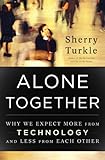I’ve always found Professor Turkle, from MIT, to be both thoughtful and thought-provoking — she’s spent her career observing and learning about and thinking about how we interact with technology, and how that interaction shapes us as a society. It’s interesting stuff that I wish more people paid more attention to, so I was happy to read this book about how a couple of types of technology are changing us.
The first part of the book I was a little ambivalent about; it focuses on how we interact with what I’ll call robots: physical machines in our environment, more or less humanoid. Lots of good experiment-based reflection on how we interact with objects, and I think significantly deeper and more nuanced than, say, Cliff Nass’ work a decade or so that he wrote about in The Media Equation. (Admittedly, we’re a lot further down the road now than when Nass wrote that, but even when it had just come out, I found it to be an extremely superficial analysis.)
The second half of the book is what I really wanted to get into: how are we changing the way we relate to other actual human beings as we moderate more and more interactions through electronic media. In lay terms: how are digital social networks affecting the way we communicate, experience, and live our lives, both with those who are physically with us and those who aren’t.
I thought Turkle did a good job with a bunch of this topic, with one proviso: the technology and products we use are now evolving so quickly that it seems to me that any clinical, experimental understanding of what’s going on is going to necessarily be years out of date, even for highly motivated, diligent, and speedy researchers.
I think there weren’t a ton of clear conclusions in the book, but much that we should all think about more deeply, so I’ll leave you with a few of Professor Turkle’s passages. If you care about understanding what’s changing and why in our communications and interpersonal interactions, you should read this book. A few quotes:
“Networked, we are together, but so lessened are our expectations of each other that we can feel utterly alone. And there is the risk that we come to see others as objects to be accessed—and only for the parts we find useful, comforting, or amusing.”
“The media has tended to portray today’s young adults as a generation that no longer cares about privacy. I have found something else, something equally disquieting. High school and college students don’t really understand the rules. Are they being watched? Who is watching? Do you have to do something to provoke surveillance, or is it routine? Is surveillance legal? They don’t really understand the terms of for Facebook or Gmail, the mail service that Google provides. They don’t know what protections they are “entitled†to. They don’t know what objections are reasonable or possible. If someone impersonates you by getting access to your cell phone, should that behavior be treated as illegal or as a prank? In teenagers’ experience, their elders—the generation that gave them this technology—don’t have ready answers to such questions.”
“The networked culture is very young. Attendants at its birth, we threw ourselves into its adventure. This is human. But these days, our problems with the Net are becoming too distracting to ignore. At the extreme, we are so enmeshed in our connections that we neglect each other. We don’t need to reject or disparage technology. We need to put it in its place. The generation that has grown up with the Net is in a good position to do this, but these young people need help. So as they begin to fight for their right to privacy, we must be their partners. We know how easily information can be politically abused; we have the perspective of history. We have, perhaps, not shared enough about that history with our children. And as we, ourselves enchanted, turned away from them to lose ourselves in our e-mail, we did not sufficiently teach the importance of empathy and attention to what is real.”
Great stuff. Read it. 🙂


slide.013-tm.jpg
Apr 5, 21:31 › bizim mekan: thank you very much admin. Oct 18, 6:51 › duygu sohbet: seviyeli online duygu sohbet odalar? Oct 6, 10:01 › ????????: 1968's "The Secret War of Harry Frigg" stars Paul Jun 13, 23:25 › PeterKed:Home
Jun 26, 21:11 › kev: I am sorry I missed this when it actually occurred Jun 19, 17:00 › Ken: I was doing a search on "shoulder problems" and came